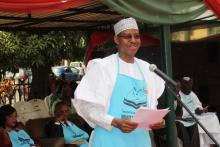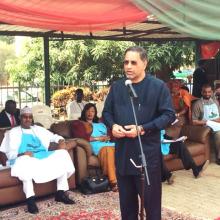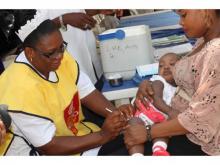Nigeria introduces inactivated polio vaccine into routine immunization schedule
Abuja, 20 February 2015 -- Nigeria has introduced the inactivated polio vaccine (IPV) into the nation’s routine immunization schedule at a ceremony presided over by the supervising Minister of Health, Dr Alhassan Khaliru which was attended by the WHO Country Representative (WR), Dr Rui Gama Vaz and other development partners such as UNICEF, USAID, CDC, DFATD – Canada among others, in Abuja on 20 February 2015. IPV is very safe and highly effective in preventing paralytic disease caused by all three types of polio viruses.
In May 2012, the World Health Assembly declared the completion of poliovirus eradication to be a programmatic emergency for global public health and called for a comprehensive polio endgame strategy. As one of its four major objectives, the plan calls on all oral polio vaccine (OPV)-only using countries to introduce at least one dose of inactivated polio vaccine (IPV) into routine immunization schedules by the end of 2015, strengthen routine immunization and withdraw OPV in a phased manner, starting with type 2-containing OPV.
Speaking at the launch, the Minister stated that the triple benefits accruable from the use of the IPV include risk mitigation against wild poliovirus type 2, boosting immunity against types 1 and 3 as well as tackling the risk of circulating vaccine-derived poliovirus (cVDPV). According to him “these provide a quantum-leap opportunity for Nigeria in the polio eradication end game strategy”.
Nigeria remains one of the three countries with endemic polio transmission. Substantial progress has been made in recent years towards polio eradication with no case of WPV1 being reported in the last six months and no reported cases of WPV3 since Nov 2013.
There are significant positive trends in improving routine immunization coverage with the reported OPV3 coverage of 67% in 2013 compared with 54% in 2010 (WHO-UNICEF Estimates 2013). However, there was an increase in circulating vaccine derived polioviruses cVDPV type 2 in 2014 with 30 cases reported.
Delivering his speech on behalf of WHO and other development partners, Dr Vaz commended the government on the progress made so far towards interrupting polioviruses transmission and noted that IPV will boost the immunity of children and hasten polio interruption from Nigeria. He also pledged continued support in strengthening routine immunization and health systems to sustain the gains.
The WR however cautioned against complacency in finishing polio in the country as there are still risks of circulation and re-infection.
IPV will be introduced in phases: The first phase was planned for February 2014 in northern endemic States while the second phase introduction in the remaining states is scheduled for 16 March 2015. At the State level, Bauchi, Jigawa, Yobe and the Federal Capital Territory have already flagged-off campaigns on IPV introduction in routine immunization.
It is on record that Nigeria accelerated the introduction of IPV in mass polio campaigns in 2014 with more than 3 million doses administered to children 14 weeks to 59 months of age.
________________________________________
For additional information, please contact:
Technical contact:
Dr Pascal Mkanda; Tel: +234 803 402 2140; Email: mkandap [at] who.int
Media contact:
Ms Charity Warigon; Tel: +234 810 221 0093; Email: warigonc [at] who.int
________________________________________
The Supervising Minister of Health, Dr. Khaliru Alhassan
Dr Rui Gama Vaz delivering his speech






